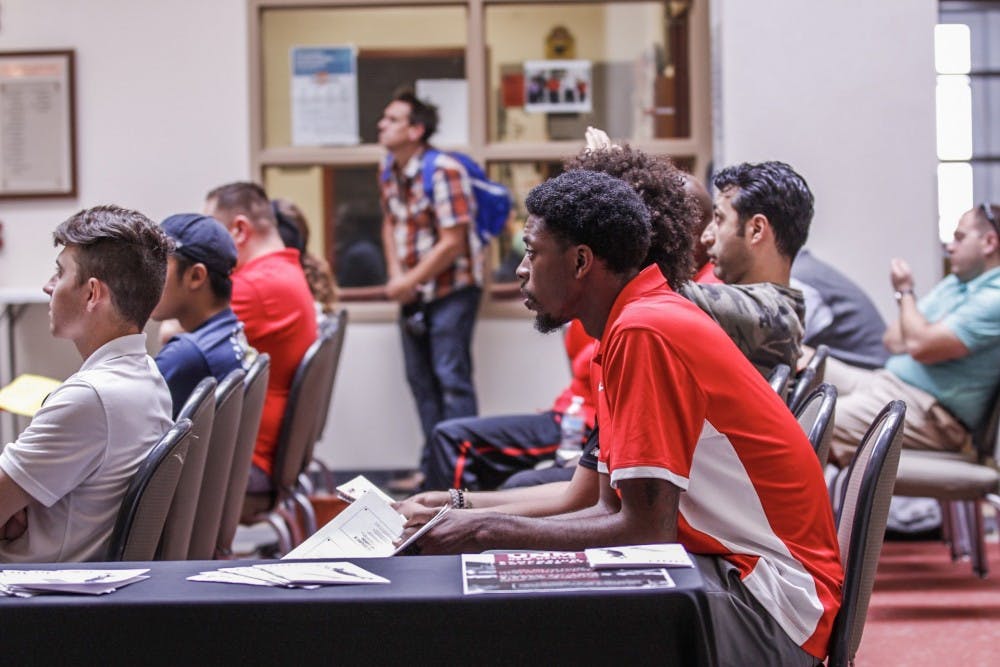College athletes from different sports teamed up Monday at the Second Symposium on College Athletics to discuss ideas of equity and fairness both on and off the field.
The symposium was sponsored by the Lobo Scholars Program, which brings together the Honors College and athletics department to support students and student athletes. It featured 15 presentations on topics ranging from the challenges created by club sport structure to the societal pros and cons of football.
Ryan Swanson, a UNM professor and one of the Lobo Scholars Program directors, said that this year’s symposium was shorter than last year’s because presentations were limited to only seven minutes — but he still thought the event began good conversations.
The symposium was broken into five parts: athletics today, stories you might not know, ethical questions, new ideas, and a vision for the future.
Two presentations that got the most audience response discussed whether or not student athletes should be paid. Currently, student athletes are not allowed to receive pay and benefits given to employees due to NCAA rules, but do receive compensation through things like scholarships.
Attorney and UNM professor Amelia Nelson examined the question from the perspective of First Amendment rights and argued that college athletics are headed to a system where athletes could receive royalties based on the use of their name or image. The question of whether and how to pay college athletes is complicated, she said.
“With the seven minute presentation it leaves so much (out), it’s like flying across the tip of an iceberg,” she said. “The bottom line is, when it comes down to student athletes and how much work they perform day in and day out, so much of their work goes to the benefit of the educational system and the member institution.”
Nelson, who is researching antitrust laws and the First Amendment, said there is a lot of money generated by college athletics that athletes never see. Many member institutions do not receive the revenue either, because it gets filtered out into different businesses and up to the NCAA.
“When you look at EA Sports or something like that where they have the name, the image, and the likeness of one of these famous athletes that ends up going pro, they make millions of dollars off that. That individual athlete is never paid for it, because (being paid) makes them ineligible for the sport they play,” she said.
This particular issue has prompted the filing of many lawsuits, Nelson said, and the need to discuss the issue is long overdue.
Derek Sokoloff, a Student Success Manager in athletics, and Kene Okonkwo, a UNM junior and student athlete, also presented on the question of paying student athletes. They examined the history of the NCAA’s rules and the time commitment and academic requirements for student athletes.
If the University were to break up the amount of money generated by athletics, UNM would have to come up with about $15 million dollars in order to pay 86 athletes on scholarship, a calculation based on the amount of money the NCAA makes off each student athlete.
Get content from The Daily Lobo delivered to your inbox
A lot of money comes from T.V. contracts, Sokoloff said, which UNM has firsthand experience with after their ESPN game this year brought in $2.5 million.
“Academically speaking, there’s a lot of things that our athletes miss out on,” he said. “In the current system put in place by the NCAA, I do believe that student athletes deserve some kind of compensation due to the fact that the majority of students are exploited.”
Regenerating money into the athletic department or programs sponsored by the athletic department could benefit the athletes, Sokoloff said, even if student athletes were not directly paid.
“I remember when I went to an A&M game when Johnny Manziel was playing,” Okonkwo said. “Texas A&M had two jerseys, they didn’t have Manziel of course, but they were selling two jerseys and they were running for $60 and everyone knew whose jersey that was.”
Another recurring theme was the importance of supporting black student athletes.
Graduate student Devon Williams presented on mentoring black student athletes at the African American Cultural Center on campus. He pointed to his own experience of mentorship in athletics but not academics, and argued that student athletes are pushed towards degrees instead of careers.
Trajuan Briggs, a graduate assistant in athletics, presented on black student athlete graduation rates and the microaggressions black student athletes face. He argued that schools need to help athletes better adapt to college.
Identity crisis is a big issue that people do not recognize on college campuses, Briggs said.
“You can’t have your student athletes adapt to only being athletes,” he said. “I believe that we need to evaluate what the term ‘student athlete’ truly should be and not what it was created for. That would make a lot of people take pride in who’s in their classroom, and whose classroom they’re actually in.”
Student athletes need to be taken more seriously in the classroom, he added.
“I think, not only UNM, but people across the country need to have more black faculty in different departments — more than your African American classes that are usually not taken seriously,” Briggs said.
The event closed with a presentation by Finnie Coleman, chair of the UNM Athletic Council, encouraging athletes to create new traditions that will connect the student body to athletics long after they graduate.
“Student athletes need to demonstrate for the rest of the student body how to dream out loud and move forward to try and achieve those dreams,” he said.
Cathy Cook is a news reporter at the Daily Lobo. She can be reached at news@dailylobo.com or on Twitter @Cathy_Daily.






